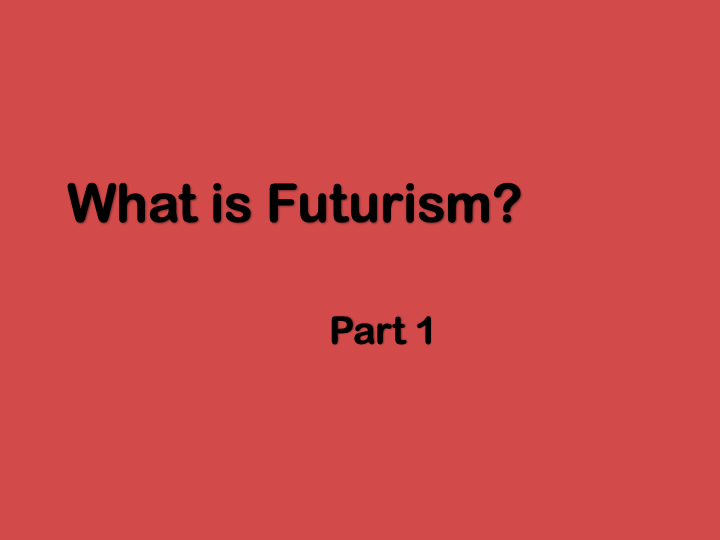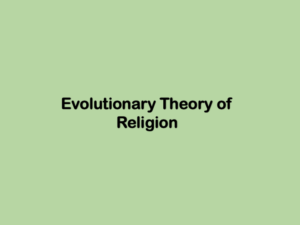What is Futurism? Part 1
In previous posts we discussed one school of interpretation of Biblical end times, preterism. Preterism places greater emphasis on the imminency of the second coming of Christ and the subsequent Kingdom of Heaven, when Jesus rules on earth, than on the literal interpretation of end-times prophecy. Futurism, on the other hand, places greater emphasis on the literal fulfillment of end-times prophecy. In this post, we further explore futurism.

In previous posts we discussed one school of interpretation of Biblical end times known as preterism. Preterism places greater emphasis on the imminency of the second coming of Christ and the subsequent Kingdom of Heaven, when Jesus rules on earth, than on the literal interpretation of end-times prophecy. Futurism, on the other hand, places greater emphasis on the literal fulfillment of end-times prophecy. In this post, we further explore futurism.
What does Futurism Mean?
Simply enough, futurism is a school of end times interpretation that argues that most Biblical prophecy was not fulfilled in the past and instead will be fulfilled sometime in the future, hence the name futurism. In contrast to preterists, futurists place greater emphasis on the literal fulfillment of Biblical prophecy than they do on the imminency of the Kingdom of Heaven. Since many end-times prophecies have not yet been literally fulfilled, and the Bible in inerrant, then the fulfillment of these prophecies must occur at some time in the future.
The Second Coming (Parousia) and the Kingdom of Heaven
As we discussed in the posts on preterism, several passages in the New Testament seem to teach the second coming of Jesus and his subsequent rule on earth would happen within the lifetime of the Apostles, the original followers of Jesus. However, since the Bible also teaches that the second coming and the Kingdom of Heaven will follow the Kingdom of the Beast and the Antichrist, and futurists believe these events are still in the future, then logically the Kingdom of Heaven must still be in the future also.
Partial Fulfillment of Prophecy
In order to account for the imminency of the Kingdom found in the New Testaments, futurists must argue for a partial fulfillment, an idea sometimes described as “already but not yet.” Partial fulfillment is when a prophecy is fulfilled partially during one event, but then fulfilled again, but fully during a second, later event.
One example is the Abomination of Desolation. In the 70-weeks prophecy found in Daniel chapter 9, Daniel speaks of a desecration of the temple.
The people of the prince who come will destroy the city and the sanctuary; and its end will be with a flood, and war will be even to the end. Desolations are determined. He will make a firm covenant with many for one week. In the middle of the week he will cause the sacrifice and the offering to cease; and on the wing of abominations will come one who makes desolate; and even to the full end, and that determined, wrath will be poured out on the desolate.
Daniel 9: 26-27
The majority of scholars agree this prophecy was fulfilled during the reign of Antiochus IV Epiphanes (175-164 BC). A Greek ruler of the Seleucid Empire, Antiochus famously placed a statue of Zeus in the temple and Jerusalem and sacrificed a pig. This event is known as the abomination of desolation.
However, almost 200 years later, Jesus again mentions the Abomination again.
“When, therefore, you see the abomination of desolation, which was spoken of through Daniel the prophet, standing in the holy place (let the reader understand), then let those who are in Judea flee to the mountains.
Matthew 24: 15-16
Clearly, Jesus is referring to an event in the future, a second abomination of desolation. Most scholars agree this second abomination will be at the hands of the Antichrist. In a speech known as the Olivet Discourse, Jesus goes on to describe the massive death and destruction that will follow this second abomination. Therefore, futurist argue the abomination of Antiochus IV Epiphanes was a first, partial event, and the abomination of the Antichrist will be a second, full event. Of note, preterists argue the abomination occurred during the reign of Nero instead of a future abomination performed by the Antichrist.
The Kingdom of Heaven
Futurists agree that scripture requires the Kingdom of Heaven to have occurred within the lifetime of the Apostles, but argue for a partial fulfillment. They argue the Kingdom of Heaven did begin within the lifetime of the Apostles, although there is disagreement on when that occurred. Some scholars point to the birth of Jesus as the Messiah, while others point to the crucifixion, resurrection, and ascension to heaven of Jesus. Another interpretation is the start of the Church on Pentecost, when the Holy Spirit descended and took up residence within the Apostles was the start of the Kingdom of Heaven.
Futurist are in agreement, however, that while the Kingdom of Heaven started in AD 70, there will be a complete fulfillment in the future. Just as the rock from Daniel chapter 2 started small and grew to fill the entire world, the Kingdom of Heaven will grow until it fills the entire earth. Ultimately, Jesus will physically return to earth, live in Jerusalem, and rule the earth for a period of 1,000 years.
The Millennial Kingdom
Futurists are also mostly in agreement that Jesus will rule on earth for a period of 1,000 years. This belief is based on passages in Revelation chapters 19 and 20. At the beginning, Satan will be imprisoned in the Abyss and at the end of a thousand years, he will be released and ultimately thrown into the lake of fire.
In contrast, preterists tend to be split on the topic of the millennial kingdom. Some teach we are currently living in the Millennial Kingdom, the age when Jesus rules the earth through the Church. In other words, there is no literal millennial kingdom. The belief is often called amillennialism, as there is no (a-) millennial kingdom. Others, who tend to be partial preterists, teach a literal millennial kingdom where Jesus rules in person. They tend to believe the millennial kingdom will occur when the Church has made the world perfect in preparation for Jesus’ rule.
The Fall of Jerusalem
Futurist also argue a partial fulfillment of the destruction of Jerusalem. They agree that partial prophecy was fulfilled in 70 AD, but also point to second, further destruction of Jerusalem. For over a thousand years, this was an impossibility, because there was no nation of Israel and Jerusalem was not a Jewish city. This changed, however, within our lifetime with the re-establishment of Israel as a nation following World War 2.
In the next post, we’ll continue with our discussion of futurism.






